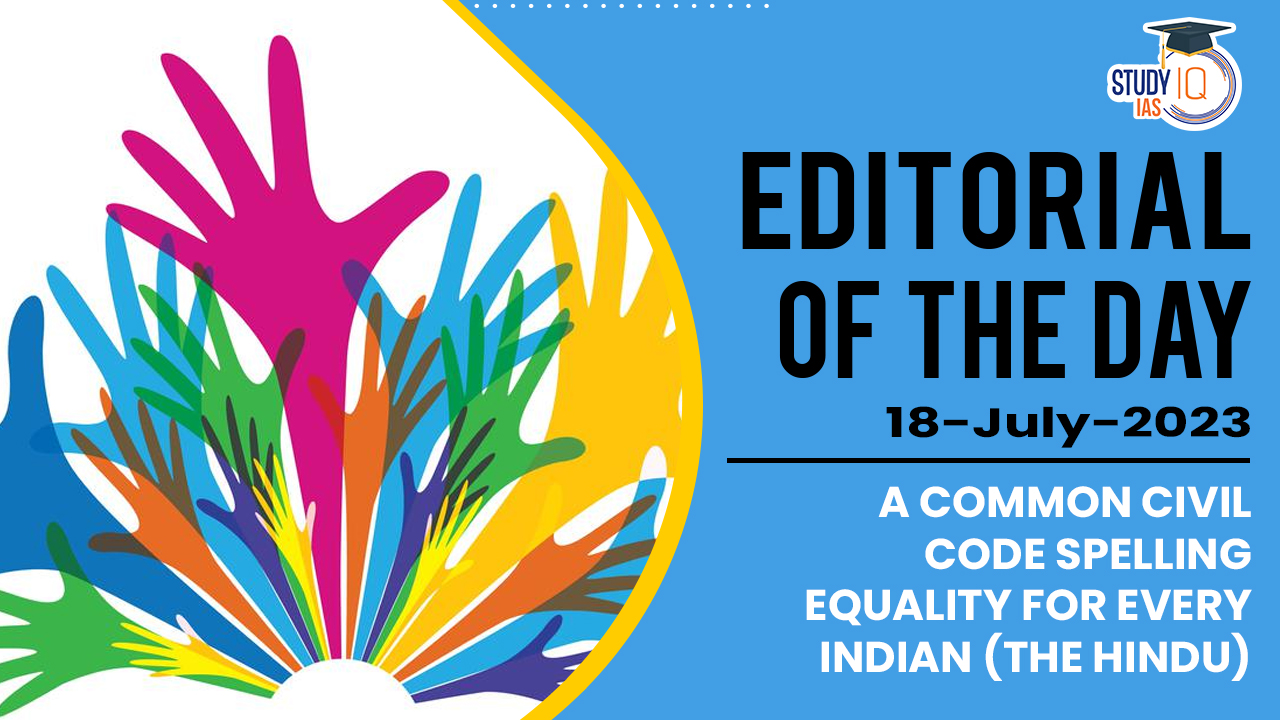Table of Contents
Context: The article is discussing the proposal for a Uniform Civil Code (UCC) in India. The 22nd Law Commission of India has called for responses regarding the implementation of a UCC, which would provide a single set of civil laws applicable to all citizens of India, regardless of their religious affiliation, gender, or sexual orientation. The article suggests that the origins of India’s personal laws are rooted in the colonial era, and their implementation may have been influenced by the British strategy of divide and rule. However, the focus of the article is on the need for a UCC and it argues that the debate surrounding the UCC is crucial as it allows Indians to have a say in the laws that govern their personal lives, which they have not had the opportunity to do before.
Background
What is Uniform Civil Code (UCC)?
- The UCC is a proposed legal framework that aims to provide a common set of laws governing personal matters such as marriage, divorce, inheritance, and adoption for all citizens, regardless of their religion.
- The UCC is intended to replace the existing personal laws that are based on religious customs and traditions.
- Historical background of UCC:

- Constitutional provision on UCC:
- The Uniform civil code is mentioned in article 44 of the Indian constitution of 1950 as a directive principle of state policy (DPSP).
- Article 44 states that “The State shall endeavour to secure the citizens a Uniform Civil Code (UCC) throughout the territory of India.”
- Current state of UCC in India:
- At present, Goa is the only state in India with a uniform civil code.
- The Portuguese Civil Code of 1867, is applicable to all the people having their domicile in Goa. There is no uniform civil code in the rest of the country.
- Apart from the above the government has brought several legislations in line with the UCC such as the amendments to Hindu code bills (They provide uniformity in legal provisions to all religions who are not Muslim, Parsi, Jews, and Christians) and the Special Marriage Act, 1954 (It provides a form of civil marriage to any citizen irrespective of religion).
Need for UCC in India:
- Different religious communities in India are currently governed by different personal laws.
- For example, Hindu personal law is codified in “four Hindi code bills”: the Hindu Marriage Act, Hindu Succession Act, Hindu Minority and Guardianship Act, and Hindu Adoptions and Maintenance Act. The term ‘Hindu’ also includes Sikhs, Jains and Buddhists for the purpose of these laws.
- Certain aspects of Muslim personal law are expressly recognised in India in acts such as the Shariat Application Act and Dissolution of Muslim Marriages Act.
- Christian marriages and divorces are governed by the Indian Christian Marriages Act and the Indian Divorce Act, while Zoroastrians are subject to the Parsi Marriage and Divorce Act.
- This has led to the emergence of several social evils in the society, especially those adversely impacting the dignity of women.
- The women have fewer rights than the men under these laws. Also, the religious personal laws give birth to many taboos; for instance, patriarchy, early marriage, dowry, domestic violence etc.
- Thus, a uniform personal law will bring about uniformity and undo all the evils that have crept inside our existing personal laws.
Arguments in favour of UCC
- Equal status to all Citizens: A Uniform Civil Code would help towards providing equal status to all citizens irrespective of the community they belong to. It is believed that a secular democratic republic, in order to provide equal status to its citizens, must have a common civil and personal law irrespective of their religion, class, caste, gender, etc.
- Promote Gender Parity and Justice: It is generally observed that in almost all religions, men are granted top preferential status in matters of succession and inheritance which results in discrimination towards women. Thus, a Uniform civil code will do away with practices which undermine a woman’s right to equality.
- Under the Hindu law, the Mitakshara branch of law denied to a Hindu daughter a right by birth in the joint family estate.
- Islamic law prescribes that generally a man’s share of the inheritance is double that of a woman in the same degree of relationship to the deceased.
- Christian women could not obtain divorce on the grounds of adultery committed by the husband, it had to be coupled with cruelty, bestiality, and sodomy. On the other hand, Christian husbands could simply declare their wives as adulteresses and divorce them.
- End contentious provisions of Personal laws: The existing personal laws of all religions are based upon the upper-class patriarchal notions of the society. Thus, the codification and implementation of the Uniform Civil Code will destroy the sanctity of the patriarchal orthodox people or will oppose it profusely.
- Promote national integration: During constituent assembly debates, Shri Alladi Krishnaswamy Ayyar had talked about the problems of having excessive cultural relativity. He believed that having separate personal laws would limit the scope of reform and breeds communalism. Single secular law on various personal matters would raise a sense of oneness and the national spirit.
- Accommodate the aspirations of the young population: The social attitude and aspiration of the young population is shaped by universal and global principles of equality, humanity and modernity. Thus, the enactment of Uniform Civil Code will help in utilizing their full potential towards nation building.
- Simplification of laws: The UCC will simplify the complex laws around marriage ceremonies, inheritance, succession, adoptions making them one for all. This will also help in reducing the burden on the Judiciary.
- Sign of a modern Progressive Nation: Personal laws were formulated in specific spatio-temporal context and should not stand still in a changed time and context. Having UCC will help the society move forward based on the modern constitutional value system of liberty, equality and justice.
The Judiciary on Uniform Civil Code (UCC)
- Shah Bano Case (1985): The Supreme Court held that Parliament should outline the contours of a common civil code as it is an instrument that facilitates national harmony and equality before law.
- Jordan Diengdeh case (1985): The court opined and observed for the reformation of law of marriages by having a uniform law applicable to all people irrespective of religion and caste.
- Sarla Mudgal Case (1995): The Supreme Court of India directed the Ministry of Law and Justice to reflect the steps taken and efforts made, by the Government of India, towards securing a “uniform civil code” for the citizens of India.
- John Vallamattom case (2003): The Supreme Court held “It is regrettable that Article 44 of the Constitution has not entered into force. A common civil code will help the cause of national integration by removing contradictions based on ideologies”.
Decoding the Editorial
The article emphasizes the importance of a universal civil code that ensures equality and non-discrimination among all citizens, regardless of their religious background, gender, or sexual orientation.
India’s Personal Law Structure:
- Currently, India follows different personal laws for different religious communities, such as Hindu personal law, Muslim personal law, and Christian personal law.
- These laws were formulated during the colonial era when the British government, without proper consultation with the Indian population, established separate laws for different religious communities.
- Personal laws in India are categorised based on religion or social origins, leading to a segregated legal framework.
- There is a patriarchal bias in these personal laws, which favours men and denies women equal rights and opportunities.
- The patriarchal nature of personal laws is evident in various instances, such as the privileges given to men in Hindu Undivided Families, limited maintenance rights for divorced Muslim women, restrictions on women inheriting ancestral property in certain tribes, and excommunication of Parsi women who marry outside their community.
- The existing personal laws do not address the needs and rights of marginalised groups, such as the LGBT community, who were disregarded during the colonial era and even faced criminalization for their consensual actions.
- The current approach to personal laws, with their patriarchal core, hinders gender equality and poses a challenge to India’s claim of being a true democracy.
- The caste system, despite being ancient, was abolished in the early years of independent India, suggesting that outdated and discriminatory practices can be changed through legislation.
- The Governments are criticized for either overlooking or defending the existing personal laws without addressing their patriarchal nature and the denial of equal rights for women.
Challenge to diversity:
- The argument of diversity based on religion is challenged, with the reminder that India was not intended to be a federation of religions and that religion should not have excessive influence over political arrangements.
- The focus should be on drafting a civil code that upholds democratic principles of liberty, equality, and dignity, rather than conforming to the specific religious practices of different communities.
- A secular civil code would be in line with the character of India’s constitution.
- The claim that a common civil code infringes upon religious freedom is disputed, as religious freedom should pertain to the freedom to choose one’s faith, not to exert extra-constitutional control over individuals, particularly women’s autonomy.
- Court decisions regarding temple entry restrictions and women’s rights have set precedents for understanding the right to religion within constitutional limits.
- Instances of social issues, such as temple entry restrictions for Dalits or cases of bigamy among Hindus, should not be used to argue against ending discriminatory practices in personal laws. Instead, the focus should be on enforcing existing laws and prosecuting those who violate them.
- The rights of women within religious communities should take precedence over the demand for parity among men from different religious groups. Every individual, regardless of their religious or tribal background, should enjoy liberty, equality, and access to the rule of law guaranteed by democracy.
- Reforms in personal laws should aim to end gender discrimination and align them with democratic principles, striking a balance between individual rights and responsibilities.
Way Forward
- By limiting the discussion of personal laws to a Hindu-Muslim binary, the potential for empowering a wide section of the population through comprehensive reform is overlooked.
- The combination of gender unjust personal laws and the marginalized status of the LGBT population highlights the need for a universal civil code that encompasses all Indians and ensures justice and equality for every individual.
- The vision articulated by Prime Minister Jawaharlal Nehru during India’s Independence Day in 1947 emphasized the creation of social, economic, and political institutions that provide justice and a fulfilling life for every man and woman, without any social cleavages.
- A universal civil code is seen as a step in realising this vision.


 SSC CGL Exam 2025 Apply Online Starts Ap...
SSC CGL Exam 2025 Apply Online Starts Ap...
 Daily Quiz 19 April 2025
Daily Quiz 19 April 2025
 Vehicle-to-Grid (V2G) Technology and its...
Vehicle-to-Grid (V2G) Technology and its...





















